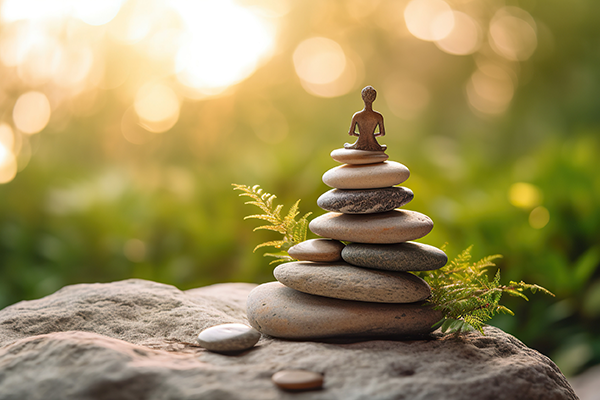happiness
You Are A Human Being, Not A Human Doing!
 We are living in a fast-paced world where we feel we must do many things every day, hardly having much time to just be. To just stop. To think. To just be.
We are living in a fast-paced world where we feel we must do many things every day, hardly having much time to just be. To just stop. To think. To just be.
Instead of embracing the fact that we are a human beings, we are in this day and age more focused on being humans doing.
We get caught in up in the web of life, with its chaos and drama. And we get frustrated and feel so rushed. There is no time to truly do the things we want to do; to spend time doing the things that matter the most.
Today, take a moment to just sit for a few minutes and simply do nothing.
Meditate. Just think about nothing and if thoughts come in, ask yourself: is this thought helping me to get in alignment with my true self? Am I in touch with the higher self that allows happiness to be a part of my space and life?
If the thoughts that are coming in are not happy or healthy, or not helping you to be spiritually aware and give you that feeling of being fulfilled, then you just allow them to go in and out. Just let it be.
No need to over think, or evaluate, or spend energy on it. Just let it go. If a thought comes in and it’s a stressor for you, note it and remember to maybe get rid of that thought or person from your life.
A Fresh Start That Goes Beyond New Year’s Eve!
 There’s something undeniably magical about New Year’s Eve. Since childhood, I’ve felt the enchantment of this time: the sparkle of possibility, the promise of new goals, the thrill of setting intentions for an amazing new chapter.
There’s something undeniably magical about New Year’s Eve. Since childhood, I’ve felt the enchantment of this time: the sparkle of possibility, the promise of new goals, the thrill of setting intentions for an amazing new chapter.
But as the wheel of the years has turned, I’ve also come to understand a deeper truth. While the New Year offers us a beautiful symbolic reset, the real power of transformation isn’t confined to the stroke of midnight. In fact, we can embrace a fresh start at any moment our spirit calls for it.
Yes, the end of the year can be a potent time for reflection and redirection, but it’s also easy to fall into the trap of waiting.
We tell ourselves we’ll begin anew after the holidays, next week, or next year, when the truth is, our power to change is always in the present.
So, whether you’re welcoming the New Year with open arms or simply seeking a shift within, remember that the most meaningful resolutions come from alignment with your true values and vision.
After all, it is how we evolve in the long run that really matters. In simple terms, by putting your words into action, preferably by using the guidelines outlined above, you should be much more successful in achieving your goals, whatever time of year it may be.
The following guidelines will help you to set intentions for 2026 that will last beyond New Year’s eve.
Wishing You A Blessed Holiday Season
 Valued clients, as we approach the close of another remarkable year, our hearts are filled with gratitude for your continued loyalty and support.
Valued clients, as we approach the close of another remarkable year, our hearts are filled with gratitude for your continued loyalty and support.
Your trust, courage, and commitment to your personal and spiritual growth have made 2025 a year of profound connection and meaningful transformation. We are humbled and honored to walk this sacred path with you every day.
Your calls motivate and inspire us daily. You remind us why we do what we do. Why we show up, hold space, offer guidance, and continue striving to uplift every soul who seeks the guidance of spirit.
Because of you, our mission continues, our purpose endures, and our dedication to service remains with each passing season.
This year, through triumphs and trials alike, we have witnessed your resilience, your breakthroughs, and your beautiful unfolding to live your best life.
It has been our privilege to support you this past year as you navigated life’s shifting tides, embraced new opportunities, and stepped ever more fully into your authentic power.
We look forward to continuing this sacred partnership with you, offering clarity and spiritual insight whenever you need it.
The holiday season reminds us of the things that matter most in life: compassion, love, inner peace, and the quiet miracles that shape our lives. It is a time to cherish the connections that uplift us and to honor the divine spark that flows through us all. May this season bring you moments of stillness, heartfelt joy, and the comforting warmth of those who love and cherish you.
How To Have A Peaceful Christmas This Year
A s magical a time of year as Christmas may be, it can still be somewhat stressful.
s magical a time of year as Christmas may be, it can still be somewhat stressful.
Nevertheless, with a little pre-planning, you should be able to get your Xmas off to a good start and enjoy the celebrations to the maximum without experiencing too much stress and drama in the process!
How good is that? Here’s how.
Set Clear Intentions
Let go of the idea that Christmas must be traditional and ‘perfect,’ and that you must make it that way for everybody. Set instead a clear intention for what your ideal Christmas will be.
After that, all you need to do is make plans that go along with your vision. Having established what Christmas really means to you, you can then use it as a guide to prepare your celebrations.
Keep It Simple
Simplicity ensures peace and calm, whereas complexity causes stress and drama. It really is as simple as that! It is imperative that any Christmas plans you make are as simple, straightforward and as streamlined as possible. Doing so should help to create a sense of calm and empowerment, which you will no doubt need to take into the New Year with you.
Living Your Best Life With Lady Luck!
 Are you closely acquainted with Lady Luck, or is she a stranger to your life?
Are you closely acquainted with Lady Luck, or is she a stranger to your life?
To be lucky, or not, depends on your personal view on luck. If you see luck as being pure chance and something you have absolutely no control over, then this will become your reality experience.
Should you, on the other hand, see luck as that moment when opportunity and careful preparation finally come together, then this should have a massive impact on how much good luck you receive in your life!
Search your memory for the last time you bought a lottery ticket and what went through your mind when you did? Did you just put it away, not think about it and tell yourself that you never win anyway?
Were your thoughts on something else, or did you conjure up some images as to how great it would be when you take your prize home? Hardly surprising what the outcome was, is it?
No, I am not suggesting you rush out and buy a load of lottery tickets and have blind faith that one, at least, will win big time, as that would also be the road to ruin. I am, however, suggesting that you try to adopt a more optimistic mind set as to what you can expect to attract into your life.
Our very beliefs define the energy frequency at which we vibrate and this, in turn, creates our attraction point. In simple terms, it is incredibly hard to attract good luck if you feel that you do not deserve it, or it is just downright impossible.
How To Anchor Yourself In Any Storm
 Happiness, peace, calm, no drama. This is the way of life we all really strive for and long for. We even design our lives in such a way as to create the illusion of having attained this.
Happiness, peace, calm, no drama. This is the way of life we all really strive for and long for. We even design our lives in such a way as to create the illusion of having attained this.
Yet, life happens. There are stresses. There are arguments, fights, heartaches. Yes, there is pain.
We sometimes find ourselves in situations not of our own making, and circumstances that anger us. Yet, at the end of each day, if we can go to bed knowing we were honest, and we did what we believed with all our heart was right, then we have inner peace and happiness.
Yes, we all do make mistakes. We do things out of anger or hurt, then later regret. But if we work hard to try to resolve the situation, we can be happy within ourselves.
No one can say words to us that bring us to unhappiness; no one can take actions that hurt us if we don’t let it destroy our faith within.
Becoming the rock in the middle of the storm is key. We must keep our mind clear, not let others tell us that we are no good, and avoid trying to become what others want us to be.
We have to be what the spirit within tells us to be. Then we will be happy. We will be anchored in the center of the storm.
In all our lives, there comes a time to make major decisions. Our first wisest choice is to ask the Creator, our Higher Power, through our prayers and meditations, what is best. The second is to get expert opinions.
 I was meditating deeply one afternoon wanting to connect with my spirit guide. I wanted to see if I there was anything that I needed to know, or anything that could help me be a better person. I then heard the words: “Time waits for no one.”
I was meditating deeply one afternoon wanting to connect with my spirit guide. I wanted to see if I there was anything that I needed to know, or anything that could help me be a better person. I then heard the words: “Time waits for no one.”